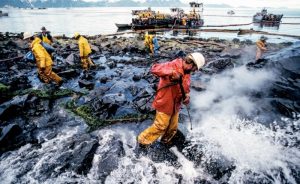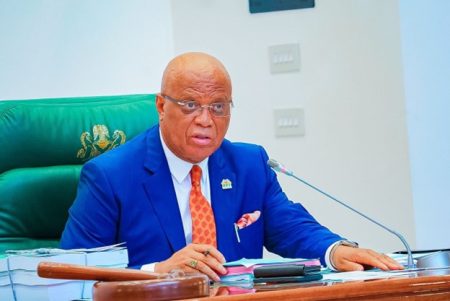Lagos — In the more than a quarter century since Shell Plc left Ogoniland in southern Nigeria, oil has continued to ooze from dormant wellheads and active pipelines, leaving the 386-square mile kingdom’s wetlands shimmering with a greasy rainbow sheen, its once-lush mangroves coated in crude, well-water smelling of benzene and farmlands charred and barren.

So, when the $1 billion Ogoniland cleanup began in 2019, backed by Shell’s funding pledge and support from the United Nations, it was heralded as the most ambitious initiative of its kind anywhere in the world. But now, UN Environmental Programme documents seen by Bloomberg and reported for the first time indicate that the project — far from being exemplary — is making one of the earth’s most polluted regions even dirtier.
“We had hoped that the Ogoniland cleanup process would set the standard for the cleanup that will have to take place in the Niger Delta as a whole,” said Mike Karikpo, an Ogoni attorney with Friends of the Earth International. “But we’ve not seen any impact. There ought to be some impact on the lives and livelihoods of people whose lands and rivers were impacted by this oil.”
In a scathing review of the Ogoniland cleanup efforts, led by the Hydrocarbon Pollution Remediation Project, or Hyprep, the UN body paints a picture of rampant mismanagement, incompetence, waste and lack of transparency. It highlights the haphazard storage of oil-soaked soil that lets chemicals seep into uncontaminated grounds and creeks, contracts awarded to firms with little environmental-cleanup experience and proposals for millions of dollars in unneeded work.
Bloomberg reviewed six UNEP documents produced over the past year, some of which had been shared with Nigeria’s environment ministry, Hyprep and its governing bodies. They included an audit of ongoing cleanup efforts, a look at Hyprep’s bidding process and a list of recommendations for restructuring the agency.
Hyprep dismissed UNEP’s criticism as “baseless, untrue and unfair,” with its director of technical services, Philip Shekwolo — a former Shell official — saying in an emailed response to questions that the government body designed its techniques specifically to avoid the “possibility of secondary pollution” and has so far provided exceptional value for money. The Nigerian government didn’t respond to requests for comment. Stefan Smith, a UNEP senior program manager, declined to comment on non-public documents, while saying that the UN body is “currently wrapping up its project support in line with the agreed date at the end of 2022.”
In an emailed response to questions, Shell said: “We recognize how important the success of the cleanup is to Shell and will continue to explore every opportunity to provide technical support to Hyprep.”
The London-based company’s wholly owned local subsidiary Shell Petroleum Development Company of Nigeria, or SPDC, sits on Hyprep’s governing council and board of trustees. Shell blames oil theft and sabotage for most of the interminable spills that plague the delta, but said it cleans up areas affected by leaks originating from its facilities, irrespective of the cause.
As Hyprep’s practices and effectiveness are questioned, Ogoniland residents and their international representatives say the European energy giant and others who pumped oil there should be held to greater account.
“The oil companies should be responsible for cleaning up the environment,” said Daniel Leader, a partner at UK law firm Leigh Day that represents an Ogoni community and another group of delta villages in an ongoing case against Shell. They “have essentially deflected their legal obligations and created this para-statal that has failed to deliver.”
Shell’s liabilities in the Niger Delta have been mounting — it paid 55 million pounds ($66.4 million) to the Bodo community in 2015 and agreed to cough up 45.7 billion naira ($109 million) last year to compensate the Ejama-Ebubu community. The company’s efforts to sell onshore assets in the country have stalled pending a decision on $1.9 billion in compensation it was ordered by a Nigerian court in 2020 to pay to 88 plaintiffs.
Last year, it suffered defeats in two landmark overseas cases brought by Niger Delta communities. A January 2021 court ruling in the Hague ordered Shell’s Nigerian unit to pay unspecified damages to farmers for oil spills that occurred more than 15 years ago. A few weeks later, the UK supreme court ruled that cases brought by the Bille community and the Ogale people in Ogoniland could be heard in English courts.
The UK judgment is “a big deal because obviously there are significant liabilities arising out of Shell’s Nigerian operations and they wanted to isolate the parent company from being held responsible,” said Leader, noting that investigators working for his law firm are interviewing thousands of people in the delta who could be brought into the case.
Ogoniland is a small sliver of the Niger Delta, which is a vast, fertile, 27,000-square-mile network of labyrinthine creeks fringed by rich mangrove forests that is home to more than 30 million people. Around 60% of Nigeria’s 1.3 million barrels a day comes from the delta and near its shores, flowing through miles of aging, largely-unsecured pipelines — easy pickings for thieves in one of the poorest places on earth. The head of Nigeria’s national oil company said in April that the country loses about a fifth of its oil production to theft every day.
Shell maintains that criminality is the root cause of the area’s ecological woes.
“We continue to believe that litigation does little to address the real problem in the Niger Delta: oil spills due to crude oil theft, illegal refining and sabotage with which SPDC is constantly faced and which cause the most environmental damage,” it said. “SPDC works closely with the regulators, local communities and other stakeholders to address this challenging issue.”
Shell has been the most dominant oil company in Nigeria since it first struck oil in the Niger Delta in 1956. It has built more than 6,000 kilometers (3,700 miles) of pipelines, drilled more than 1,000 oil wells and produces 39% of the country’s crude. Its local joint venture pumped oil in Ogoniland from the late 1950s to 1993, when it left the area amid mass protests led by the writer Ken Saro-Wiwa accusing it of polluting farmlands and fisheries. The military government brutally cracked down on the protests, executing Saro-Wiwa and eight other Ogoni leaders in 1995.
“Shell has never taken responsibility for anything they did,” said Patience Osaroejiji, head of the Coalition of Ogoni Women. “If you go to the places they say they cleaned up, you will see that oil is still running there. Nothing you can plant there grows. The grass can’t even grow.”
Oil pumped by Shell and other companies including Chevron, ExxonMobil and Eni helped to turn Nigeria into a prime example of the resource curse. As the oil industry flourished — generating billions of dollars in profits for the companies — it propagated corruption, conflict, inequality and environmental distress. Now, with the world weaning itself of fossil fuels, these energy giants are leaving the Niger Delta to concentrate on deep-water blocks, selling their decades-old infrastructure to local firms.
*Neil Munshi and William Clowes – Bloomberg
Follow us on twitter



